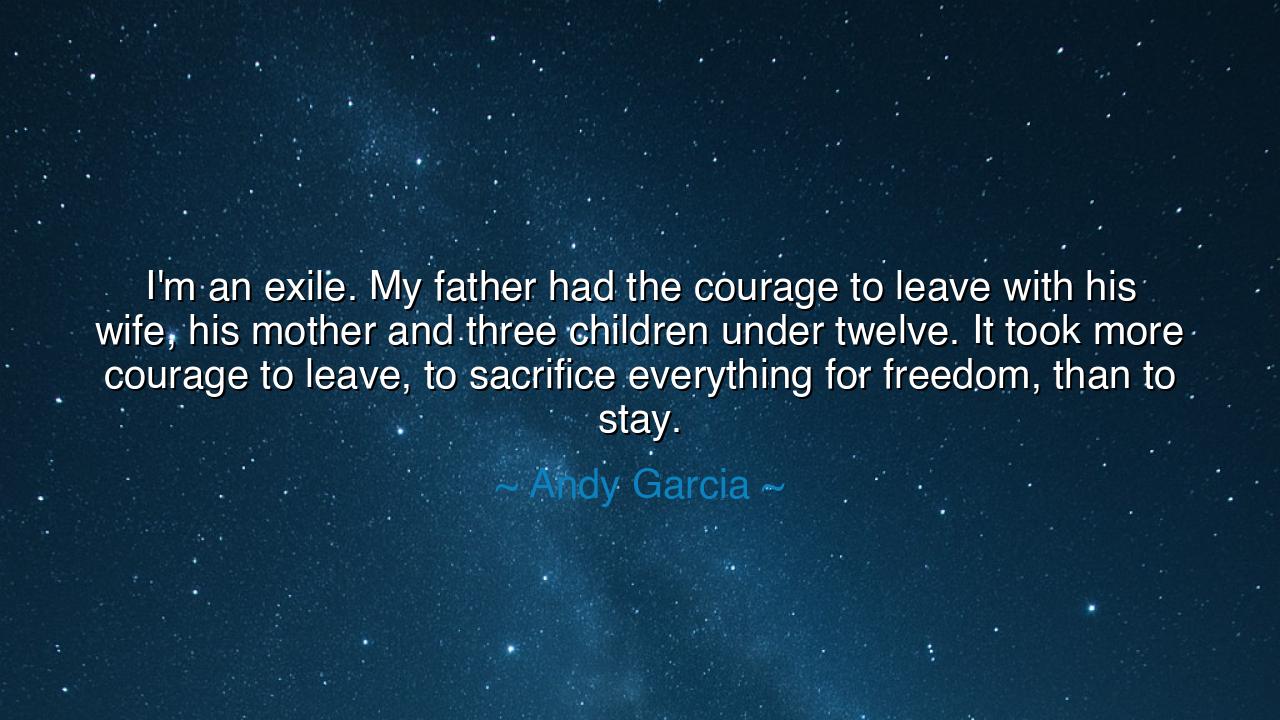
I'm an exile. My father had the courage to leave with his wife
I'm an exile. My father had the courage to leave with his wife, his mother and three children under twelve. It took more courage to leave, to sacrifice everything for freedom, than to stay.






“I’m an exile. My father had the courage to leave with his wife, his mother and three children under twelve. It took more courage to leave, to sacrifice everything for freedom, than to stay.” — Thus spoke Andy Garcia, the actor and son of Cuba, whose words echo with the grief and glory of all those who have been torn from their homelands in the name of liberty. In this reflection, he does not merely honor his father; he honors the eternal human struggle — the choice between safety and freedom, between the comfort of the familiar and the perilous road to dignity. His words stand as a hymn to courage, that most sacred of virtues, which demands both loss and faith.
The origin of Garcia’s quote lies in the story of his family’s exile from Cuba after the rise of Fidel Castro’s regime. In the early 1960s, when freedom was being crushed beneath the iron weight of ideology, Garcia’s father made a choice that many could not: he left everything behind — his home, his country, his memories — for the uncertain promise of liberty in a foreign land. Such a decision, Garcia tells us, was not born of weakness but of immense strength. For it is easy to stay and endure, to submit and survive, but it takes a rarer courage to leave all that one loves for a future unseen.
This story of exile is ancient. Throughout history, the noblest souls have often been those who walked away from comfort toward truth. Moses led his people out of Egypt, not knowing where the desert would lead, guided only by the promise of freedom. Aeneas, the hero of Troy, fled his burning city carrying his father on his back, his son by his hand, and the gods in his heart — leaving behind glory for destiny. These stories endure because they mirror the same human condition that Garcia speaks of: the necessity to sacrifice what is known in order to preserve what is right. The exile becomes both wanderer and witness — stripped of everything, yet clothed in integrity.
To be an exile is to live in a paradox. One carries two worlds within — the world left behind and the world yet to be made. The body may find refuge, but the heart remains divided. And yet, as Garcia implies, there is a sacred nobility in this fracture. His father’s act was not simply a departure; it was a declaration. By leaving, he affirmed that freedom is worth more than comfort, and dignity more than possession. Those who choose exile do not abandon their homeland — they preserve its soul by refusing to live under its corruption. Theirs is not escape, but resistance; not weakness, but will.
The courage to leave is one of the greatest acts a human can perform, for it requires a death before rebirth. To leave behind one’s home, language, and identity is to shed one’s former life like a serpent’s skin, entering the wilderness with nothing but faith. This courage does not roar; it whispers. It is the trembling strength of a father who looks at his children and chooses their future over his own comfort. Garcia’s admiration is thus not for the grandeur of rebellion, but for the quiet, sacrificial bravery that sustains generations — the courage that builds legacies from loss.
History remembers many who have carried such burdens. Aleksandr Solzhenitsyn, exiled from the Soviet Union for speaking truth, endured isolation but never surrendered his conviction that freedom of spirit is man’s greatest possession. Mahatma Gandhi, though never exiled by sea, exiled himself from luxury and ease to live among his people, embracing simplicity as an act of liberation. In every era, those who give up the world for principle — whether physically or spiritually — prove that true courage is not the act of conquest, but of renunciation.
The lesson, then, is as clear as it is profound: freedom demands sacrifice. To live truthfully, one must sometimes walk away from comfort, familiarity, even belonging. Whether one flees a nation, an illusion, or a way of life, the act of leaving what is false for what is true is the path of the brave. Be not afraid to begin again, to wander, to rebuild. Remember that exile, in its truest sense, is not a punishment but a passage — the journey from bondage to authenticity.
So remember, my child: freedom is never free, and courage is rarely comfortable. There will come moments when the easier choice is to stay — to conform, to endure — but it is the harder choice, the act of letting go, that defines a soul. When you are called to step into uncertainty, think of those like Andy Garcia’s father, who carried not possessions but hope. For though exile may take from you the soil beneath your feet, it gives you something greater — the unshakable knowledge that the price of freedom is worth everything, and that to walk away for truth is to walk toward eternity.






AAdministratorAdministrator
Welcome, honored guests. Please leave a comment, we will respond soon